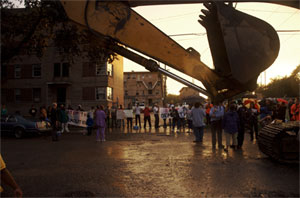Active Culture
For the Right of Return
A flood of resistance is rising in New Orleans.
This article is from the January/February 2008 issue of Dollars & Sense: The Magazine of Economic Justice available at http://www.dollarsandsense.org

This article is from the January/February 2008 issue of Dollars & Sense magazine.
Subscribe Now
at a 30% discount.
Encampments of the homeless continue to thrive under the overpasses and inside abandoned courtyards of New Orleans, while the city, state, and federal governments are planning to destroy four large public housing projects that could be sheltering people today.

A human chain stops a bulldozer at the B.W. cooper public housing complex in New orleans on Dec. 12, 2007. (Photo credit: Edwin Lopez)
The New Orleans City Council unanimously voted on Dec. 20, 2007 to demolish the low-income housing, at the end of a tumultuous public hearing from which hundreds of residents were barred, leading to a police riot with tasers, pepper spray, and mace outside the Council Chambers.
Two and a half years after Hurricane Katrina, the official count is 12,000 homeless, but local housing activists say the figure is much higher.
"Rents are up to three times what they were before Katrina," said Sakura Koné, a member of the Common Ground collective, a volunteer organization offering mutual aid and support ranging from medical clinics to bioremediation of contaminated soil.
Koné estimates the homeless population could be as high as 20,000. "I've spent a lot of time with these people, underneath the freeway and bridges, and most of these people have jobs," he said.
Many people imagine that the current housing crisis in New Orleans was caused primarily by the hurricane and subsequent flooding, but the four public housing complexes slated for demolition were not badly damaged by Katrina. Since before the storm, city officials and their allies have wanted to replace these poor communities with mixed-income developments, and Katrina has provided a plausible justification and the federal funding to demolish and rebuild.
The result, said Koné, is a transfer of land from the public sector to "the big developers, the multi-millionaires who stand to become billionaires."
The politicians claim that the new housing developments will reduce crime and improve the lives of those low-income residents who are lucky enough to win a spot in the new buildings. Residents counter that the loss of subsidized housing means real suffering for the poor.
"All these holier than thou folks who are saying we need a new model of public housing, if you're so concerned about [the poor], why have you not made a demand on the economic system to provide living wage jobs? That's why people have a need for public housing—to subsidize their meager wages. The vast majority of public housing residents work, and the vast majority of them work in our tourist industry. And it pays meager wages. And when I say meager wages, I mean below minimum wage," Koné said.
The demolitions have begun, but a coalition of social service, religious, and economic rights groups are organizing public housing residents and their allies. The Coalition to Stop the Demolitions is fighting for one-for-one replacement of subsidized housing, an end to privatization, and instituting rent control at pre-Katrina levels.
"No one can speak better to the plight of these residents than the residents themselves, and we're helping to organize the residents as a political bloc," Koné said.
The coalition is calling for a boycott of this year's Mardi Gras and the NBA All Star Game in February. At the same time, they're looking for volunteers to come to New Orleans and help organize against the demolitions.
"The resistance is not dead, it is not over," Koné added. "It will go on as long as there are residents out here who are struggling for decent and affordable housing."
